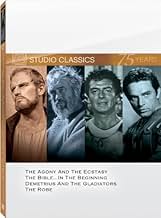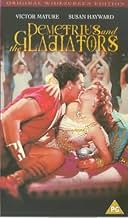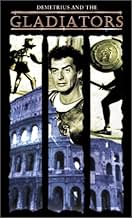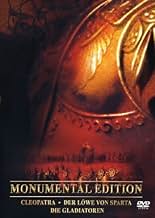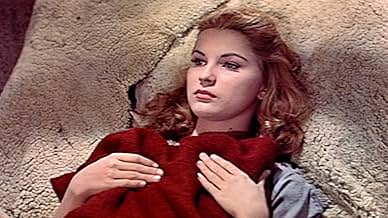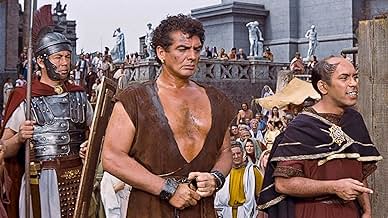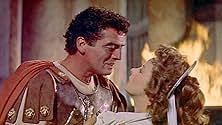Nella Roma del 1 ° secolo, lo schiavo cristiano Demetrio viene inviato a combattere nell'arena dei gladiatori e l'imperatore Caligola cerca la veste di Gesù per i suoi presunti poteri magici... Leggi tuttoNella Roma del 1 ° secolo, lo schiavo cristiano Demetrio viene inviato a combattere nell'arena dei gladiatori e l'imperatore Caligola cerca la veste di Gesù per i suoi presunti poteri magici.Nella Roma del 1 ° secolo, lo schiavo cristiano Demetrio viene inviato a combattere nell'arena dei gladiatori e l'imperatore Caligola cerca la veste di Gesù per i suoi presunti poteri magici.
- Regia
- Sceneggiatura
- Star
- Soldier
- (non citato nei titoli originali)
- Gladiator
- (non citato nei titoli originali)
- Cousin
- (non citato nei titoli originali)
- Gladiator
- (non citato nei titoli originali)
- Varus
- (non citato nei titoli originali)
- Gladiator
- (non citato nei titoli originali)
- Guard-Escort of Prisoners
- (non citato nei titoli originali)
Recensioni in evidenza
Back in those days you really only saw movies once - with mum and dad at the local cinema on Friday night. But my memory wrapped around this film almost as if I had a rewind button inside my head. It was one of those big-screen epics that made an impression on me.
With your Roman Empire movies, your best bet is to set the story in the reign of one of the three mad emperors - Nero is tops, but Caligula and Commodus are the next best thing. Someone like Augustus with his stable, 40-year reign is just a little too sedate when it comes to drama - a bit like the Eisenhower era.
Set in Rome during the reign of Caligula, all Demetrius (Victor Mature) wants to do is hand over the robe of Jesus to Peter (Michael Rennie), and lead a quiet life as a potter. Instead he has his faith shaken, and ends up in the arena where he dispatches many opponents and a streak of tigers. Along the way his most dangerous enemy turns out to be Messalina (Susan Hayward), the wife of Caligula's uncle Claudius. It takes Peter and a good buddy from the arena, Glycon (William Marshall), to guide him back to the light.
Well that's the story; the script is there to keep the spectacular arena scenes apart, and clear the set for Jay Robinson's viperish and eye-poppingly campy interpretation of Caligula. Despite tigers, dancing girls, oiled muscles, nets, tridents and short swords, the movie would have been pretty heavy going without Jay.
Victor Mature is on screen for just about the whole movie and for the most part is either angry or anguished. I've always thought he was pretty good for a guy who once told a club, which did not accept actors as members, that he wasn't an actor and he had the reviews to prove it.
One actor who was perfect in his role was Richard Egan. He plays Dardanius, a gladiator with attitude, and he looks the part with more muscles and teeth than Burt Lancaster.
Susan Hayward gave Messalina some of the same medicine Jay Robinson gave Caligula; together they keep the movie from getting too serious. I love the way Messalina does a complete turnaround right at the end to wrap the whole thing up in about two minutes flat.
Debra Paget is beautiful. Michael Rennie has gravitas and William Marshall is imposing - two great voices in the one movie.
Although technical aspects weren't things I noticed much back in the 50's, I can now appreciate how Franz Waxman's score gave the film spirituality and depth. Waxman was a composer who contributed intelligent scores to every film he did without repeating himself.
I must admit I still have a soft spot for this film; the arena scenes alone are worth the price of admission.
The central character, Demetrius, is a former slave who, after assaulting a soldier who is molesting his girlfriend Lucia, is sentenced to fight in the arena as a gladiator. This causes him difficulties as he is a Christian whose moral code will not permit him to kill another man, even in self-defence. He survives, however, largely because he attracts the attention of Messalina, the wife of Claudius, uncle of the Emperor Caligula. Later, believing that Lucia has accidentally been killed by another gladiator, Demetrius renounces his Christian faith, and fights fiercely, killing the man he believes to have been responsible for her death and several others. His courage and skill with a sword lead to his being made a tribune in the Praetorian Guard, and he becomes Messalina's lover. As in "The Robe", the robe which Christ wore to His crucifixion plays an important part in the film; Caligula wants to get his hands on it because he believes that it has magical powers and that it will give him the secret of eternal life.
Several of the epics of this period combined, incongruously, an improving religious message with a good deal of eroticism, with much bare female flesh on display- examples include "Solomon and Sheba", "Esther and the King" and "Salome", where we get to see the famous dance of the seven veils, but it is made clear that, contrary to the Biblical version of the story, Rita Hayworth's character is in fact a virtuous heroine who only is flashing her legs in public in a desperate attempt to save John the Baptist from his fate. There are elements of this strange combination of godliness and sexiness in "Demetrius", but the sexiness is very much downplayed. Messalina's notorious promiscuity is alluded to rather than shown on screen, and the scene between the gladiators and the women brought in to entertain them may be an orgy, but it is a very decorous one. The film-makers were clearly more interested in the element of godliness, and, unlike some films of this type, "Demetrius" raises genuine moral issues about pacifism, non-violence and Christian forgiveness.
Demetrius himself is a man who goes through a crisis of faith and abandons his Christian beliefs in favour of an ethic based on revenge and worldly ambition. His conscience, however, is troubled, especially after he is reproached by his old friend St Peter. He is a more complex and interesting figure than many epic heroes, so it is unfortunate that the part was played by Victor Mature, an actor whose success often seemed to owe more to his ruggedly masculine good looks and his virile physique than to his acting technique. Susan Hayward (an actress who could often look bored and listless when asked to play roles that did not interest her) makes a weak Messalina. Neither give their worst performance (in Hayward's case that must surely have been "The Conqueror"), and Mature brings a certain rough sincerity to his part, but I felt that the film might have been improved with other actors in these roles.
Nevertheless, there was much I enjoyed about the film. Michael Rennie was appropriately dignified as Peter, played as a sort of ascetic philosopher, although I would agree with the reviewer who pointed out that it would be hard to imagine him ever working as a fisherman. I also liked William Marshall as Glycon, the former African king now forced to fight as a gladiator, who befriends Demetrius. ("Spartacus", a better film than "Demetrius" although it owes something to it, also features a sympathetic black gladiator who befriends the hero).
Jay Robinson, who played Caligula, has been criticised by some reviewers for overacting, although I must say I liked his performance. Historians have doubted whether the real Caligula was actually insane, although he was undoubtedly cruel and eccentric, but in the context of this film he is definitely presented as a lunatic, a man who has literally been driven mad by power to the point where he believes himself to be a god. (Not even Hitler went that far). There is an interesting contrast with a modern epic, "Gladiator", in which Joaquin Phoenix plays another tyrannical Roman Emperor, Commodus, as a basically weak and insecure young man. Although Phoenix's performance works well in the context of that particular film, the way the role of Caligula was written called for something quite different- the sort of ranting, over-the-top performance which might be unfashionable now but would have been less controversial in the fifties.
Although the standard of the acting is mixed, I generally enjoyed the film. It does not reach the standard of the really great epics, such as "Spartacus" or "Ben-Hur", but it works well on the level of spectacle, with fine sets and costumes and some exciting scenes of gladiatorial combat, and has a more intelligent script than many epics. 7/10
The performances of the cast, especially the minor characters, was excellent, although Mature was still awfully stiff in his performance. But a good sequel over all.
Peter (Michael Rennie) gave Demetrius of Corinth (Victor Mature) their master's robe to keep for him As we all remember, Demetrius took the robe from the foot of the cross before Jesus died
By order of Caligula, 20 pieces of gold were authorized to pay for information concerning the robe that Jesus wore to the cross Defending Lucia (Debra Paget) from malicious attack of a Praetorian Decurion, Demetrius is caught and sentenced to train as gladiator in the Claudian school
Being fully a Christian entails having a commitment: Demetrius, obviously, is condemned to death because he can't take a man's life Puzzled by his religion, and fascinated by his magnificent physique, and wanting to find out if Demetrius will kill or not his opponent, Messalina asks to be put in the arena against the king of swordsmen the Nuban Glycon (William Marshall).
The dramatic moment of the film comes when Lucia (Debra Paget)Demetrius' sweetheartsneaks in and is attacked by Dardanius (Richard Egan) and other gladiators... His faith shaken, Demetrius makes several kills, renounces his god, and succumbs to Messalina's charms...
Susan Hayward looked gorgeous as the wicked Messalina The part, however, was not developed... It might have been an ideal role for this beloved actress... This was Hayward's second movie with the radiant Debra Paget, who was still considered a promising starlet, but, again, they were never together in a scene...
Future Academy Award winners Ernest Borgnine and Anne Bancroft had small parts... Michael Rennie and Jay Robinson were excellent in their respective roles... Julie Newmeyer was one of the dancing girls, long before she became Julie Newmar and played Howard's rival in "The Marriage-Go-Round."
"Demetrius and the Gladiators" is a lively, efficient sequel to "The Robe," with emphasis less on religiosity than on the brutality of the arena
Lo sapevi?
- QuizThe set of the Christian neighborhood in Rome has previously been used in La tunica (1953) (of which this film is the sequel) as the village of Cana. We can easily recognize the well with old broken columns.
- BlooperWhilst Caligula (Jay Robinson) is talking to Claudius and Messalina about the death of Marcellus and Diana, he draws a dagger and plays with Claudius by threatening to stab him with it. When he puts it back in its sheath, sheath and dagger inadvertently turn upside down sticking out at an odd angle and irritating Jay Robinson, who tries twice and finally rights the sheath at his waist.
- Citazioni
Demetrius: We traveled here together from Galilee, persuading people to give up their lives for a beautiful dream.
[he attempts to hand a goblet of wine to Peter]
Demetrius: Take it Peter. It's real... hot spiced, with cinnamon and cloves.
[chuckles and looks towards Messalina]
Demetrius: Did you know that Jesus could turn water into wine? And that was only one of his tricks.
Peter: Yes, only one. Anything that was base, He could make noble. He found a leper and made him clean. He found death and He made life. He found you a slave, and He made you free.
Demetrius: Get out!
Peter: And now you've won a great victory over Him, haven't you tribune ? You've made yourself a slave again.
- ConnessioniFeatured in Pozione d'amore (1992)
I più visti
- How long is Demetrius and the Gladiators?Powered by Alexa
Dettagli
- Data di uscita
- Paese di origine
- Lingua
- Celebre anche come
- Demetrio e i gladiatori
- Luoghi delle riprese
- Azienda produttrice
- Vedi altri crediti dell’azienda su IMDbPro
Botteghino
- Budget
- 4.500.000 USD (previsto)
- Lordo in tutto il mondo
- 11.911 USD
- Tempo di esecuzione1 ora 41 minuti
- Proporzioni
- 2.55 : 1
Contribuisci a questa pagina



